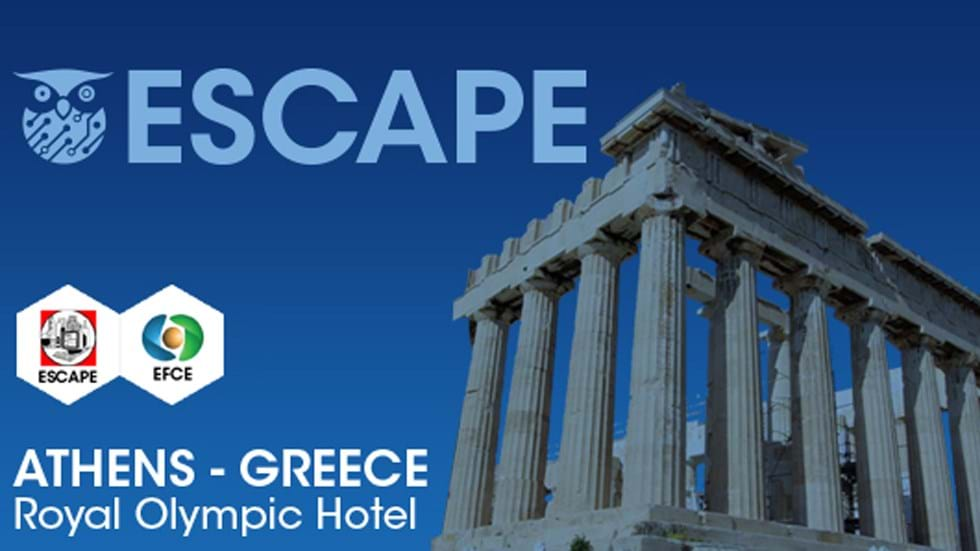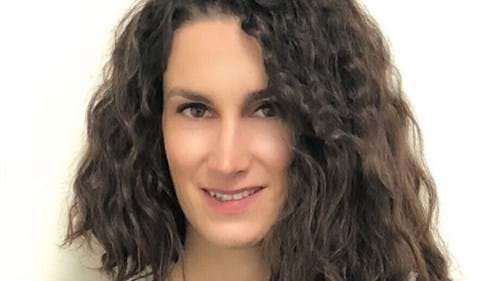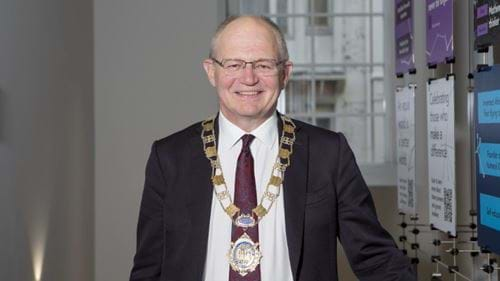CAPE Crusaders: Exploring Career Opportunities in Computer-Aided Process Engineering
ESCAPE-33 attendee Tom Cowley provides his key takeaways from the IChemE-hosted panel discussion at the computer-aided process engineering symposium in Greece

THE FOUR-DAY European Symposium on Computer-Aided Process Engineering (ESCAPE-33) in Athens, Greece promised to address emerging and significant challenges in process systems engineering as a driver to “rebuild industry with a systemic and holistic approach”.
Conference themes included systems methods in industrial biotechnology, multi-scale energy systems engineering, sustainable supply chains, education and knowledge transfer, safe and sustainable products by design, and modelling and optimisation for multi-scale integration.
As part of the symposium, the second day featured an IChemE panel discussion on “Career Opportunities in Computer-Aided Process Engineering” chaired by Vassilis Charitopoulos and Maria Papathanasiou.
Charitopoulos, from the University College London’s Chemical Engineering department, has garnered acclaim for his extensive research in responsive process manufacturing, Industry 4.0, energy systems, and optimisation under uncertainty. His journey is punctuated with accomplishments, including the Springer Thesis Award and the UCL David Newton Prize.

Papathanasiou, meanwhile, is an assistant professor (now senior lecturer) at Imperial College London and brought a wealth of knowledge in biopharmaceutical process development, vaccine supply chain, and personalised medicine. She has also adapted Industry 4.0 principles in pharmaceutical processes and has been developing digital twin technology. She has over 40 peer-reviewed publications and was awarded IChemE’s Junior Sargent Medal in 2023.
Although much of the discussion was focused on career advice, it initially addressed the advancements in CAPE, offering information on where the industry is heading and what tools professionals should familiarise themselves with. Here are my takeaways:
Harnessing big data in CAPE
Charitopoulos provided enlightening insights from his research, notably underscoring the significance of big data in process engineering. As engineers grapple with vast quantities of data collected from plant sensors and hardware, machine learning algorithms offer a way to sift through the noise. The crucial query then arises: can these algorithms pre-emptively detect process disturbances? His perspective made me deeply consider the potential of this technology in enhancing our process efficiency.
The necessity of digital twins
Papathanasiou's exploration of the use of digital twin methodologies, particularly in biopharmaceutical processes, highlighted the invaluable role of these virtual models in predictive performance. What piqued my interest was her description of them as abstractions from reality yet equipped with all the essential components to be effective.
Integration across platforms
One attendee asked about open-source data and the fact that the escalating complexity of processes requires the seamless integration of various CAPE software solutions. Such a trend has led me to ponder the industry's trajectory, emphasising the urgent need for design software suited for both chemical engineers and non-technical users to fast-track innovation. Importantly, software should offer easy interlinking, and embrace open-source principles, enabling us to collaboratively share and build upon each other's work, further propelling innovative efforts.
CAPE in the cloud
One of the most notable shifts that I and a most of the attendees have observed recently is the migration of CAPE tools to cloud platforms. This transition isn't merely a technological shift but represents a transformation in how we approach computational tasks. By moving to the cloud, these tools benefit from enhanced scalability, allowing for more expansive and complex projects to be handled with ease. Additionally, the cloud ensures easier access, and allows these tools to wider audience, irrespective of their geographical location. Perhaps most importantly, the sheer computational power that cloud platforms can offer is unparalleled. This evolution promises a brighter, more streamlined future for the industry.
Embracing diversity: the key to innovation
Joan Cordiner, a leading figure in chemical engineering education and research at my home university, the University of Sheffield, set the discussion with a powerful statement on diversity. She discussed gender imbalance in the field and emphasised the importance of addressing the issue. "Diversity in research teams leads to diverse solutions. Gender balance is not just about equality it is also about improving the potential for innovative ideas," she explained. One attendee noted that the professor’s words really resonated, saying they were “a call to action for what modern engineering should aspire to be”.
Clarity and communication

Following on from Cordiner, David Bogle, an expert in process systems engineering and the 81st president of IChemE, tackled communication. "The key to successful research is having a clear vision and being able to articulate it well,” he said. “Remember, communication is just as vital as your technical abilities when it comes to advancing in your career." Bogle’s emphasis on the importance of effective communication went beyond the theory as he offered practical advice on how to make an impression, drawing on his role as the technical programme director for the 2005 World Congress of Chemical Engineering.
Aligning with industry
Industrial postdoc positions were the focus of Burcu Beykal, known for her work in simulation and modelling at the University of Connecticut. "They provide an opportunity to apply academic knowledge to solve real-world industry problems, bridging the gap between theory and practice, and preparing you for branches in your career path" she advised.
The panellists encouraged potential postdocs to carefully consider if industrial roles aligned with their career aspirations. They emphasised the importance of researching the role and institution thoroughly before applying, ensuring the position would be a “strategic” fit for their career path and personal growth.
Beykal further underscored the need to sync research with industry demands and how attuning to industry trends can yield more targeted and impactful research.
Embracing global opportunities
Nikos Diangelakis brought a rich history of expertise in mathematical optimisation, software development, and spearheading projects spanning energy, finance, and pharmaceutical sectors. An assistant professor at the Technical University of Crete and previously an optimisation specialist at Octeract in London, he has also enjoyed roles at Texas A&M University and Imperial College London.
Not surprisingly, given his background, he was keen to advocate a world view when embarking on your career path. "Moving abroad for experience can be a game-changer,” he said. “It broadens your perspective, exposes you to diverse work cultures, and ultimately equips you to tackle global challenges in process engineering."
Diangelakis did not shy away from addressing the potential challenges of such a move. He noted that adapting to a new cultural environment and navigating different regulatory standards could be demanding, emphasising the need for careful planning, flexibility, and openness to new experiences. The panel chuckled at his remark that the decision boiled down to a “multi-integer optimisation” that only you, the audience could solve yourself.
Sharing personal anecdotes, his insights were not only informative but enthusiastic, with the takeaway being: explore the world, seize opportunities, and become part of the global engineering community.
The pillars of research

Dimitrios Varvarezos, technology fellow at Aspen Technology and a pioneer in computer-aided process engineering, came equipped with a philosophy every engineer should use. "Always remember the essential qualities of a good researcher: intellectual curiosity, honesty, and integrity.
“These are the pillars that will uphold your career, regardless of the path you choose," he went on to explain.
Strategic career planning
Bogle, once again, offered his thoughts on the concept of a five-year career plan, including navigating transitions between different sectors, such as moving from academia to industry, or vice versa.
"Without a clear vision, researchers might find themselves adrift, moving from project to project without a coherent trajectory," he warned. Urging anyone in early careers to steer a purposeful path, he went on to explore how you can you effectively navigate transitions, the key challenges, and how can you overcome them. The discussion showed the importance of understanding the requirements and opportunities in both academia and industry, and building skills and networks that can apply to both.
Mentorship and growth
Mentorship emerged as a vital theme, with Varvarezos strongly advocating for its role in shaping a career. Cordiner extended the conversation to include work-life balance, discussing the necessity of personal relationships alongside career ambitions, plus being mindful of mental health.
Soft skills
The panel concluded with a discussion on the role of soft skills in engineering. Cordiner highlighted the necessity of not only being technically proficient but also able to communicate, collaborate, and negotiate effectively. These skills, combined with staying open-minded, curious, and maintaining integrity, were presented not as optional extras but essential for greatness.

Reflections and final thoughts
The panel finished with a note of caution that held the audience’s attention: "Don't think you know everything." This simple yet profound statement encapsulated a recurring theme of the conference, of continuous learning and humility in their career pursuits. As the attendees left the conference hall, they were reminded of what it means to be in the field, not only in their individual roles, but on the transformative potential of computer-aided process engineering.
Conclusion
The panel discussion was one of the highlights of the ESCAPE-33 conference, and left attendees invigorated, guided towards an environment marked by diversity, adaptability, collaboration, sustainability, and continual growth. The insights shared at ESCAPE-33 were more than theoretical, but a practical and relevant guide to the next frontier in engineering, where curiosity, global perspective, and a willingness to embrace change will fuel innovation.
Recent Editions
Catch up on the latest news, views and jobs from The Chemical Engineer. Below are the four latest issues. View a wider selection of the archive from within the Magazine section of this site.




